Illinois became the first state in the United States to pass legislation to end book bans. Signed by Governor JB Pritzker June 12, House Bill 2789 takes effect January 1, 2024.
Introduced by Illinois Secretary of State Alexi Giannoulias, who serves at the State Librarian, the bill received significant support both in the House and Senate. The signing by Pritzker is no surprise, but it is a welcome one and makes Illinois a leader in addressing the ongoing rise of book bans.
“Here in Illinois, we don’t hide from the truth, we embrace it,” said Governor JB Pritzker in a press release. “Young people shouldn’t be kept from learning about the realities of our world; I want them to become critical thinkers, exposed to ideas that they disagree with, proud of what our nation has overcome, and thoughtful about what comes next. Everyone deserves to see themselves reflected in the books they read, the art they see, the history they learn. In Illinois, we are showing the nation what it really looks like to stand up for liberty.”
HB 2789 is unique in that it ties state funding for libraries to a written library bill of rights. This could come in the form of ALA’s already-established guidelines or come through what may be developed in a collaboration between State Librarian and State Library.
“I initiated this legislation to stand up and fight for libraries, librarians, and the freedom of speech – especially at this perilous time for our democracy,” said Giannoulias. “The concept of banning books contradicts the very essence of what our country stands for. It also defies what education is all about: teaching our children to think for themselves. This landmark legislation is a triumph for our democracy, a win for First Amendment Rights, and a great victory for future generations.”
This isn’t the only pro-education, pro-library, and pro-literacy bill signed by Pritzker this year. In addition to ensuring equal access to books at public libraries, he sent a letter to the College Board’s CEO demanding that the decision to remove certain parts of the Advanced Placement in African American Studies be returned to the text. The letter came in response to the organization choosing to remove passages deemed inappropriate by Florida’s governor Ron DeSantis and his state’s slate of censorship laws. Just this week, Pritzker joined several other state governors in demanding that textbook publishers not censor materials in the wake of Republican pressure to do so. Among the publishers who received the letter are Association of American Publishers, Cengage Learning, Goodheart-Willcox, Houghton Mifflin Harcourt, McGraw Hill Education, Pearson, Routledge Taylor and Francis Group, Savvas Learning Co., Scholastic, and Teachers Curriculum Institute.
Pritzker’s budget for fiscal year 2024 also includes $1.6 million dollars to build Dolly Parton’s Imagination Library as a state-wide program. This would ensure all children from birth to 5 would receive high-quality books mailed to them at no cost, no matter their income. Research has shown that books in a child’s home increases their vocabulary, academic achievement, and more.
“This announcement today is important for our democracy because it protects access, and as a former educator, I have seen firsthand what the lack of access means for our communities – access to voting rights, access to gender rights, access to health care, and access to fully funded schools,” said Chicago Mayor Brandon Johnson. “We cannot continue turning the clock back on children who have already experienced decades of disinvestment, so I applaud this legislation, and stand in full support of this movement to continue providing access to the rich and dynamic cultures that our students and educators represent.”
Lieutenant Governor Juliana Stratton, who was present at Chicago’s Herold Washington Library alongside Pritzker, Giannoulias, lawmakers, activists, educators, and more, emphasized that such a signature signals the state’s commitment to accepting, embracing, and encouraging all people to be who they are.
“I’m proud that our administration is standing in the gap for literary justice and equity by becoming the first state in the nation to prevent book banning, so that our children and communities can be represented, and have access to reading material that celebrates our diversity and uniqueness. Now more than ever, efforts to censor educational and social reading materials are on the rise, and we cannot let extreme views harm LGBTQ+ communities or BIPOC authors and readers, simply because of who they are or who they love.”

